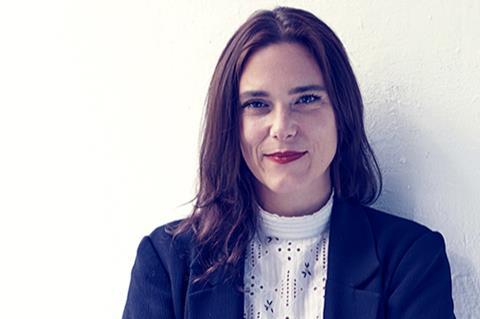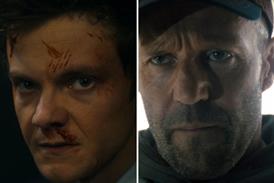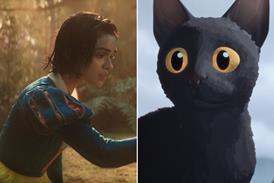
It is fitting that for the 30th year of the Geneva International Film Festival, artistic director Anais Emery and her team are going back to the future.
“It was very important to recall the history of the festival but not through a retrospective,” says Emery of the event that takes place in the Swiss city from November 1-10.
”We wanted to renew, to celebrate and underline GIFF’s speciality and specificity.”
That means showcasing innovative storytelling delivered via the myriad audiovisual mediums available to creators, from film, TV and web content to installations, virtual reality and extended reality (XR) works. For while GIFF has ‘film’ in its name, the Swiss event has long embraced how the audience for audio-visual content has evolved and was one of the first to bring TV content into the fold.
Among the projects the 30th edition will platform is The Golden Key, created by artists Marc Da Costa and Matthew Niederhauser, using artificial intelligence.
The interactive XR installation immerses audiences in a future world that has endured climate change, inviting them to reconstruct a lost mythological history by interacting with AI generated digital prompts.
The European premiere of Da Costa and Niederhauser’s project is in the running for GIFF’s Future is Sensible competition strand and a prize of CHF10,000 (£8,900) prize. The work won the XR Experience jury award at the SXSW 2024 festival earlier this year.
“Every audience member will have their own film, it’s a cinematographic experience,” Emery notes. “The experience shows the potential of AI, but also the limits. All these questions about magic, about feelings and so on, [the AI engine] doesn’t understand very well.”
Emery admits she does not know if skeptical audiences and industry will be reassured by highlighting AI’s current inability to fully capture the human element of storytelling. “It is very important that people know we didn’t select an algorithm, we selected a work conceived, produced and overseen by two artists for GIFF,” she says. “AI is only the tool.”
This year GIFF boasts 93 works of which 44 are films, 26 series and 23 are immersive experiences. There are four competition sections: international feature, international series, international immersive and the convergent competition – the latter section featuring projects from all three formats.
GIFF is also launching a new prize, the Swiss series storytelling award to grow the festival as a hub for innovation in audiovisual fiction. The prize is the first of its kind in Switzerland and aims to reward the most creative narrative screenplay with the winner picking up a CHF 20,000 (£17,800) cash prize, from SSA and Suissimage cultural funds.
Vision
Films “pushing the limits of the cinematic experience” include Brady Corbet’s The Brutalist, Diva Futura directed by Giulia Louise Steigerwalt, Rich Peppiatt’s Kneecap, Rumours directed by Evan Johnson, Galen Johnson, Guy Maddin and Spermageddon from filmmakers Rasmus Andre Sivertsen and Tommy Wirkola.
“In the film section we have some great new visions,” says Emery, also citing titles including Noémie Merlant’s female-led horror comedy The Balconettes, sissident Russian director Kirill Serebrennikov’ Limonov: The Ballad and Aude Léa Rapin’s dystopian thriller Planète B, starring Adèle Exarchopoulos and Souheila Yacoub.The Brutalist, which follows the journey of Hungarian-born Jewish architect László Tóth who emigrates to the US in 1947, is 215 minutes long and will screen with an intermission.
“It’s interesting to see the influence of the series format in films with these very long films that are epic and take the time to go really deep into the psychological path of the characters,” says Emery.
Swiss co-production The Shameless by Konstantin Bojanov, which was in Cannes’ Critics’ Week and Koya Kamura’s Winter’s Son, an adaptation of global Swiss bestseller written by Elisa Shua Dusapin, are among the 10 titles vying for GIFF’s international feature strand and its CHF 10,000 (£8,900) prize. The jury is haired by Swiss filmmaker Carmen Jaquier and composed of film students.
Payal Kapadia’s All We Imagine As Light, Thierry de Peretti’s À Son Image, Wild Diamond from Agathe Riedinger, Ariane Labed’s September Says, The Girl With The Needle directed by Magnus Von Horn, Jonás Trueba’s The Other Way Around, Matthew Rankin’s Une Langue Universelle and Wishing On a Star from filmmaker Peter Kerekes round out the titles.
Leading lights
US filmmaker, screenwriter, and producer Ava DuVernay is being presented with the Film & Beyond honorary prize, and will be in town to support a quartet of her films: Origin (2023), Selma (2014), Middle of Nowhere (2012) and When They See Us (2019).
French film director, critic and writer Leos Carax will be on hand for a focus on his work which will include a screening of It’s Not Me, a work billed as being between an introspective short and a cinematographic essay, which unspooled during Cannes this year. His last two features Holy Motors (2012) and Annette (2021) will also screen with Carax scheduled to take part in a discussion of his screen endeavours.
Tales of Swiss Innovation will honour Sarah Kenderdine, director and curator of EPFL Pavilions, the exhibitions on the campus of the Swiss Federal Institute of Technology in Lausanne and head of the Experimental Museology Lab (eM+) at EPFL.
In addition to attending a conference entitled Future Cinema Systems, audiences will see her lab’s work via a screening of a digital restoration of The Panorama Of The Battle Of Murten.
“These guests mirror what we want to encapsulate in the 30th edition. To realise your artistic vision in full is becoming harder and you have to fight for it,” says Emery.
Standouts in the series programme include Whiskey On The Rocks from the team behind Scandi noir global hit The Bridge (2011), Families Like Ours from Danish filmmaker Thomas Vinterberg, The Confidante, starring Laure Calamy and Ben Wheatley’s comedy horror series Generation Z.
Digital dreams
The 11th edition of the Geneva Digital Market runs during the festival from November 4 to 7 with a mix of masterclasses, roundtables and discussions.
This year’s agenda includes a discussion on the trend in immersive entertainment in cinemas, a panel on the potential for interactive live broadcasting and a talk set to deliver an insight into the research and development (R&D) department at the BBC.
“GIFF is always looking to try and capture a piece of the future in its programming, to show the industry and the network where things are evolving,” Emery smiles. “Looking forward and taking some risk in this year edition was maybe the best homage to all my predecessors and the history of the festival.”
























No comments yet